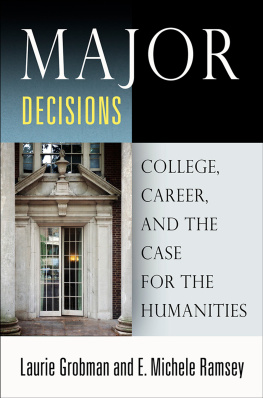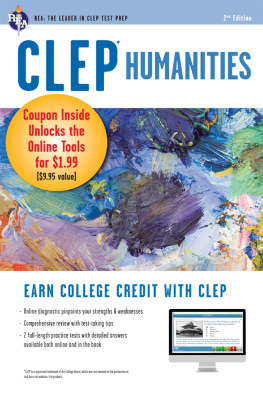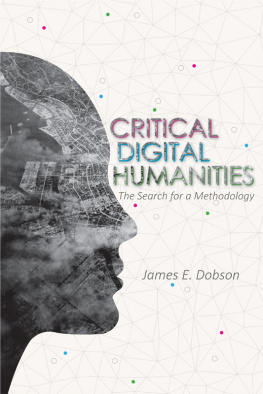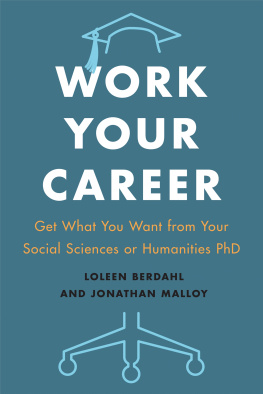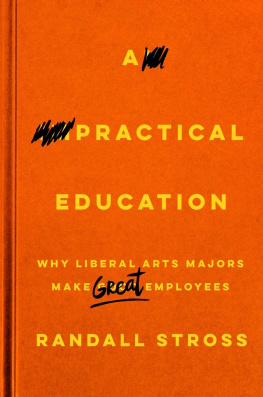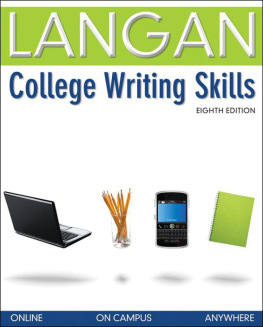
Major Decisions
MAJOR DECISIONS
College, Career, and the Case for the Humanities
Laurie Grobman and E. Michele Ramsey

University of Pennsylvania Press
Philadelphia
Copyright 2020 University of Pennsylvania Press
All rights reserved. Except for brief quotations used for purposes of review or scholarly citation, none of this book may be reproduced in any form by any means without written permission from the publisher.
Published by
University of Pennsylvania Press
Philadelphia, Pennsylvania 19104-4112
www.upenn.edu/pennpress
Printed in the United States of America on acid-free paper
10987654321
Library of Congress Cataloging-in-Publication Data
Names: Grobman, Laurie, 1962 author. | Ramsey, E. Michele, author.
Title: Major decisions : college, career, and the case for the humanities / Laurie Grobman and E. Michele Ramsey.
Description: 1st edition. | Philadelphia : University of Pennsylvania Press, [2020] | Includes bibliographical references and index.
Identifiers: LCCN 2019031231 | ISBN 9780812251982 (hardcover)
Subjects: LCSH: HumanitiesStudy and teaching (Higher) | HumanitiesEconomic aspects. | HumanitiesSocial aspects. | HumanitiesPhilosophy. | Education, HigherAims and objectives.
Classification: LCC LC1011 .G75195 2020 | DDC 001.3071/1dc23
LC record available at https://lccn.loc.gov/2019031231
To our studentspast, present, and future
Contents
Preface
As humanities faculty (Laurie in English, Michele in communication arts and sciences), weve dealt with stated and unstated assumptions about the humanitiesthe mythical English major who can only get a job making coffee or the communication major who wasted their time just learning about talking. These encounters are consistent, year after year, and include students, parents, faculty, administrators, career services professionals, and potential employers across many sectors. And though the audiences shift, the discussions largely remain the same. We find ourselves constantly having to explain and defend the humanities. And we know we are not alone.
But we see change coming. Hundreds of articles in popular and academic presses and a handful of important books over the past two years demonstrate that a movement is stirring. The humanities matter in a global economy that is shifting dramatically, quickly, and in the direction of college graduates who think broadly, critically, and ethically. The fast-paced, high-tech, global economyand the communities in which we liveneed humanities thinkers to help guide decisions that understand the human benefits and human costs of the tech revolution now and to come.
We hope Major Decisions will be read by several audiences, including current and prospective students and their parents, faculty, administrators, prospective employers, and university administrators. Current students who have chosen a humanities degree will feel confident in their decision and have the words and evidence to support it by telling their humanities story when they seek that first post-graduation job. Students just starting to think about a college major can feel emboldened to choose a major that they love. We encourage current and prospective nonhumanities students to consider supplementing their degree with a humanities minor or several courses in the humanities. Parents who may be concerned or even confused about degree options can have faith in the humanities should your child choose that route.
The book provides our colleagues in the humanities who regularly face the same set of doubts, questions, and conversations concrete examples and justifications to share with students, parents, administrators, and career services. Together, we will turn the tide of negative assumptions about the humanities.
Its likewise critical for administrators to be more supportive of the humanities and promote these programs and faculty with the stakeholders you encounter. We encourage you to be leaders in programs and opportunities that marry disparate programs, such as STEM (science, technology, engineering, and mathematics) and the humanities, for example. And we hope that youll begin to recognize that the academy is stronger when we stand together and support one another and weaker when we continue to give credence to rhetoric that trumpets some majors, vilifies others, and creates damaging divisions in the academy.
We know that career services professionals have few resources available for learning about and promoting humanities degrees, and we hope to provide ways for you to guide humanities students who seek your services in the same way that youre able to guide students engaged in programs that have a clearer path for students from the get-go, such as accounting or engineering.
Finally, throughout the book we cite numerous CEOs, entrepreneurs, and leaders in their fields who understand the value of the humanities and who are firmly committed to making sure that humanities graduates are in the room, making important decisions in all areas of business. But we are concerned that the managers and supervisors who are charged with hiring people in entry- and mid-level positions are not as aware of what a humanities graduate can add to their workforce. We hope that this book makes clear the excellent investment that companies make when they hire a humanities graduate.
Introduction
Major Decisions: The Case for the Humanities
At the unveiling of Apples iPad 2 in 2011, Apple founder Steve Jobs proclaimed, It is in Apples DNA that technology alone is not enoughits technology married with liberal arts, married with the humanities, that yields us the results that make our heart sing. Both men stressed the interdependency of STEM (science, technology, engineering, and mathematics) and the humanities.
Like the titans of technology noted above, captains of industry in the world of business laud liberal arts and humanities majors. Billionaire investor and businessman Mark Cuban predicts that theres going to be a greater demand for liberal arts majors in the future of increasing automation because when the data is all being spit out for you, options are being spit out for you, you need a different perspective in order to have a different view of the data, one that a freer thinker from the liberal arts can deliver.
Study after study, article after article, report after report say the same thing: the humanities and liberal arts are vital to the current and future economy. Yet the myths and misconceptions about humanities degrees continue to escalate, encouraging students away from these majors. Youve heard them:
Youll end up in your parents basement.
Youll be underemployed in minimum-wage jobs that you could get without a college degree.
Your major is impractical.
The humanities are elitist.
Humanities faculty and students live in books, not the real world.
The humanities focus on nonsense like comic books or outdated works by Shakespeare.
Given these disparaging attitudes, the past several years have seen significant decreases in the numbers of students majoring in the humanities. A total of 212,512 humanities degrees were conferred in 2015, falling 9.5 percent from the 234,737 degrees conferred in 2012. The sharpest declines have occurred in such field staples as English, history, and philosophy. One exception is communication, which increased its share of all humanities degrees by 44 percent from 1987 to 2015.
Next page
